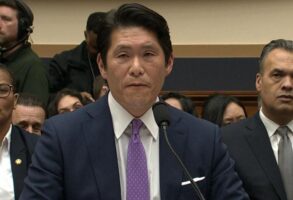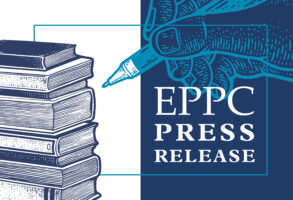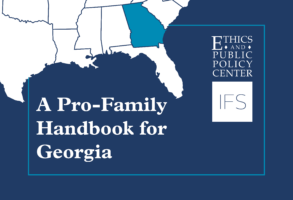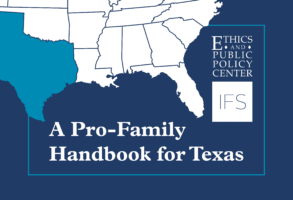Patrick T. Brown
Fellow
Patrick T. Brown is a fellow at the Ethics and Public Policy Center, where his work with the Life and Family Initiative focuses on developing a robust pro-family economic agenda and supporting families as the cornerstone of a healthy and flourishing society.
Patrick T. Brown is a fellow at the Ethics and Public Policy Center, where his work focuses on developing a robust pro-family economic agenda and supporting families as the cornerstone of a healthy and flourishing society.
His writing has been published in The New York Times, National Review, Politico, The Washington Post, and USA Today, and he has spoken on college campuses and Capitol Hill on topics from welfare reform to child-care and education policy.
He has published reports on paid leave and family policy with the Institute for Family Studies, and edited an essay series featuring working-class voices for American Compass. He is an advisory board member of Humanity Forward and the Center on Child and Family Policy and a contributing editor to Public Discourse.
Prior to joining EPPC, Patrick served as a senior policy advisor to Congress’ Joint Economic Committee. There, he helped lead research about how to make it more affordable to raise a family and more effectively invest in youth and young adults. He also previously worked a government-relations staffer for Catholic Charities USA.
Patrick graduated from the University of Notre Dame with a degree in political science and economics. He also holds a Master’s in Public Affairs from Princeton University’s Woodrow Wilson School of Public and International Affairs. He and his wife Jessica have four young children and live in Columbia, S.C.
Hur hearing shows GOP will need more than age issue against Biden
Patrick T. Brown

If Republicans were hoping that Hur’s testimony would do their political heavy lifting for them, they will have to think again.
Articles
CNN / March 21, 2024
Smaller families, longer lives: Are we ready for the coming senior care crisis?
Patrick T. Brown

The way they face the end of life, and the choices we opt to prioritize or make available, will set the script for how we treat death, the labor of caretaking, and the value of human dignity into the future.
Articles
Angelus / March 20, 2024
Opinion: After Super Tuesday, the dreaded rematch is real
Patrick T. Brown

Super Tuesday marks the end of whatever competitiveness was left in the primaries on either side of the aisle and…
Articles
CNN Opinion / March 5, 2024
The path forward on IVF
Patrick T. Brown

Reproductive technology should not be a way to radically remake family structure.
Articles
Deseret News / March 2, 2024
Senate Republicans have a path to a tax deal win
Patrick T. Brown

The child tax credit has always been an exemplar of bipartisan deal-making and is a key way of delivering for parents.
Articles
Washington Examiner / February 22, 2024
EPPC Scholars Sign Joint Letter to State Legislatures Urging Action on Tech Policy
Patrick T. Brown

On February 15, EPPC scholars Patrick T. Brown and Clare Morell signed a joint letter with Brad Wilcox and Michael…
PDF / February 21, 2024
A Pro-Family Handbook for Georgia
Patrick T. Brown

Introduction Georgia is helping the Sun Belt become an economic powerhouse. With one of the nation’s most dynamic major metro…
PDF / February 1, 2024
A Pro-Family Handbook for Tennessee
Patrick T. Brown

Introduction The strength of a state is the strength of its families. Tennessee’s recent growth, dynamism, and promise has made…
PDF / February 1, 2024
A Pro-Family Handbook for North Carolina
Patrick T. Brown

Introduction The secret is getting out—North Carolina has emerged as one of the best states for families. The Tar Heel…
PDF / February 1, 2024
A Pro-Family Handbook for Texas
Patrick T. Brown

Introduction Everything is bigger in Texas—including its success in attracting families, its economic dynamism, and its potential to provide parents…
PDF / February 1, 2024
President Joe Biden tried to put voters’ concerns about his age to rest last week with a fiery State of the Union address. From his forceful performance to his self-deprecating jokes about his age, he inoculated himself from the narrative, pushed by some on the right, that the 81-year-old couldn’t even get through a prime-time speech.
Tuesday’s appearance by former special counsel Robert Hur before Congress over his investigation into Biden’s handling of classified documents gave Republicans a new opportunity to delve into questions about the president’s memory and raise concerns about his ability to do the hardest job in the world for another four years.
But if Republicans were hoping that Hur’s testimony would do their political heavy lifting for them, they will have to think again. The hearing didn’t reveal much the initial report hadn’t already. And as part of the long march toward Election Day, the GOP will have to figure out how — and if — it can use the age issue in service of a broader argument against four more years.
In many respects, the damage to Biden was already done by the release of Hur’s report last month. Hur concluded Biden willfully retained classified information but would not face charges, describing the president as a “sympathetic, well-meaning elderly man with a poor memory.”
But the Republicans didn’t get further ammunition from his appearance Tuesday in front of the GOP-controlled House Judiciary Committee. The former special counsel had a professional demeanor, even in the face of eyebrow-raising insinuations from Rep. Hank Johnson, a Georgia Democrat, that Hur produced a partisan report in hopes of securing a future appointment to a GOP-run judicial branch.
Hur, a former US attorney, repeatedly referred back to the text of the report, rather than offering his own interpretation or speculation. And he pointedly refused to join in GOP attempts to call the president “senile,” which tells me that issue cannot be the only weapon Republicans turn to as they embark on their quest to retake the White House.
Even if Hur didn’t add much beyond the text of the report, the hearing was an opportunity for Republicans to focus on the president’s misstatements at a February press conference following the release of Hur’s report, in which he mixed up the leaders of Mexico and Egypt. The hearing also coincided with the release of the transcript of Biden’s interview, highlighting a man who twice couldn’t recall the word for fax machine, needed help remembering what years he served as vice president, told rambling stories and had “no idea” how his aides stored or handled sensitive documents.
Biden has gamely sought to defuse the age issue, often joking about being aware of his own limitations and contrasting himself favorably with Trump. Democrats, meanwhile, were quick to contrast the president’s behavior with his predecessor’s. And the transcript provided more details that provided some added context behind the initial picture painted by Hur’s report. Biden, for example, only needed a slight refresher on what year his son died, complicating how the story was originally relayed.
Biden’s campaign felt positive about Hur’s testimony Tuesday, a campaign official told CNN, with much of the Democratic-led questioning focusing on the differences in Biden’s case and former President Donald Trump’s handling of classified material. The Biden team knows the president’s electoral fortunes will likely improve as his challenger takes a more prominent place in the public eye.
So for Republicans to capitalize fully on the picture of the president painted at Tuesday’s hearing, they will need to find ways of pointing out Biden’s advanced years that underscore a deeper critique of his competency.
For example, Biden’s desire in 2021 to spend $2.2 trillion on social programs despite rising inflation, or his apparent willingness to ignore top military advisers during the tumultuous Afghanistan withdrawal, should be front and center of any campaign ad. The GOP can paint a picture of a president who sought to follow in the footsteps of Franklin D. Roosevelt but misread the moment, and who let events across the world overtake his ability to lead America.
Hur’s appearance before the House Judiciary Committee on Tuesday delivered no surprises. His sober depiction of a president with some difficulty recalling specific names and dates will remain a key arrow in the quiver of Republicans looking for partisan advantage. Biden’s age clearly remains his biggest political vulnerability and a key factor in the race.
But The Trump campaign will have to find ways of highlighting the policy failures of the Biden administration and offer some proactive policy proposals. If it cannot, it may enter the home stretch wondering why the race against a president they depict as senile is closer than it expects, ignoring the fact that many voters want a case against the incumbent’s substance as well as his style.

